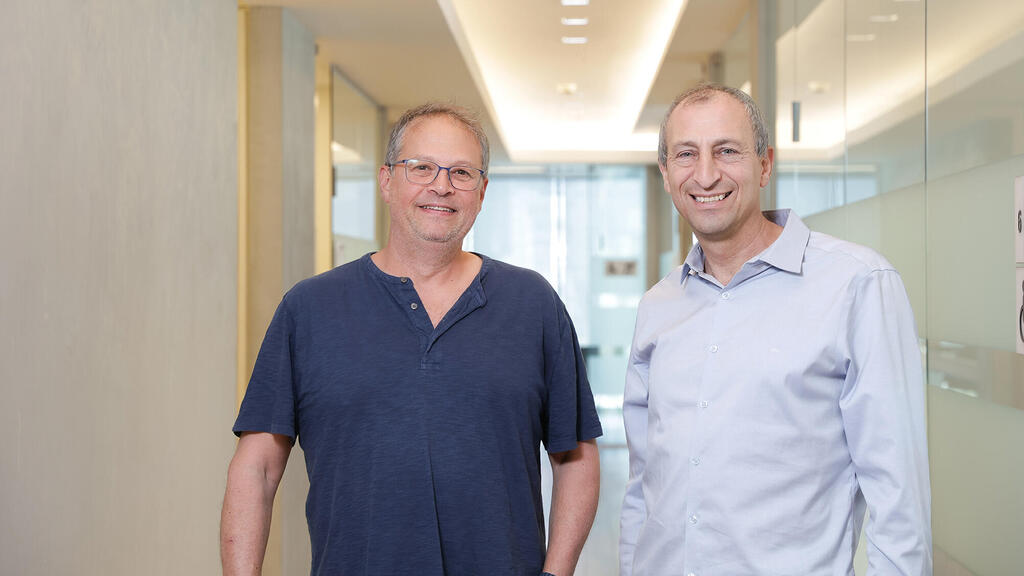
"You start with a dream, convince everyone around you it’s real, but then you have to admit you were wrong"
As part of the Growth+ project by Calcalist and Poalim Tech, Atera CEO Gil Pekelman spoke about navigating the crises that almost every startup faces in its early stages. Dataspan.ai CEO Ofer Lavi added, “Even when there is clear technological success, it doesn’t always translate into business.”
When Gil Pekelman, CEO of Atera, met with Ofer Lavi of dataspan.ai, the conversation quickly turned to what every founder eventually faces: the painful pivot from vision to reality. As part of Calcalist and Poalim Tech’s Growth+ program, the two discussed hard-won lessons on market fit, business resilience, and the personal toll of building something from scratch.
The Growth+ project, now in its second year, aims to strengthen the resilience of Israel’s high-tech industry through a series of one-on-one meetings between experienced entrepreneurs and early-stage startups, focused on offering advice, support, and knowledge around entrepreneurship, creativity, startup management, and building companies for long-term growth.
Gil, can you tell us about a crisis you experienced early on, and what you learned from it?
“We started with a hardware product in the cyber field, but quickly realized it wasn’t going to succeed. Fortunately, while working on it, we identified an opportunity in a completely different area - SaaS software focused on IT rather than security. The transition was difficult: you start with a dream, convince everyone around you it’s real, raise money, recruit employees, and rally people to your vision, and then you have to admit you were wrong. But that’s part of the journey. Almost every successful company pivots at some point, and the ability to make that shift is a huge strength. The pivot will come; it’ll be hard, but it’s often what saves the company.”
Ofer, tell us about a significant challenge you faced this year.
“I learned that even when there’s clear technological success, it doesn’t always translate into business. We’ve received great feedback from users, but when it comes to defining who the customer is, how much they’re willing to pay, and what the precise business value is, that’s where it gets challenging. My co-founder and I come from a tech background, and developing a business mindset is something we’re learning along the way.”
Gil, what advice did you give him?
“This is a process of exploration: is the current market really the right one, or are there other segments where it’s easier to translate the technology into revenue? I suggested that Ofer look into this more deeply, possibly with our help, to see whether a slight change in product or target audience is needed. It’s a question of product–market fit, a phase every startup has to go through.”
What did you learn from each other, and is there anything you'll take with you?
Gil: “Ofer managed to raise funding while serving in the reserves on the Gaza border, from his car. Nothing will stop him.”
Ofer: “When I asked Gil if the pivot was the hardest moment, he said: ‘Every six months there’s a moment like that.’ That’s an important lesson, the difficulty never really ends, it just changes form. I realized that you need to be brutally honest about the situation and make hard decisions with courage, not just at the beginning, but all the way through.”
Tell us something surprising or interesting you learned about each other.
Gil: “Ofer has eight children at home, not all of them biological.”
Ofer: “I learned that Gil grew up in the U.S. and attended a religious elementary school.”
Michal Kissos Herzog, CEO of Poalim Tech and leader of the project, concluded: “When conditions aren’t ideal and capital is scarce, it forces you to focus on what really matters. You ask basic questions like, ‘Does anyone actually need what we’re building?’ In Israel, people are used to building under less-than-ideal conditions, so there’s a strong muscle for adaptation and focus. And this period is demanding even more from that muscle. Much more.”














